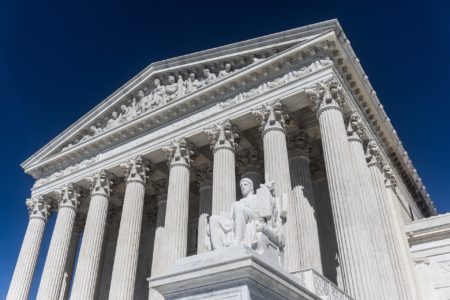
This morning, the United States Supreme Court announced that it would not review a decision from the Eleventh Circuit Court of Appeals, which held that sexual orientation is not protected by Title VII of the Civil Rights Act of 1964.
Jameka Evans is lesbian. After she was terminated from her position as a security guard, she filed a pro se (without a lawyer) lawsuit claiming that she was terminated because of her sexual orientation. Her case drew the attention of the Lambda Legal Defense and Education Fund and the United States Equal Employment Opportunity Commission, which helped her to argue the case as amicus curiae (friends of the court). A panel of the Eleventh Circuit ruled that Title VII of the Civil Rights Act does not protect against sexual orientation discrimination. But, consistent with numerous prior decisions, the Court also held that Ms. Evans could sue for discrimination based upon “gender nonconformity.”
Lambda Legal asked the Supreme Court to review the Eleventh Circuit’s decision, but the Court declined to do so this morning. Here’s an article from The Hill discussing the decision: Supreme Court Refuses to Hear LGBT Workplace Discrimination Case.
The Evans decision is consistent with a long line of precedent in the Eleventh Circuit. In fact, I previously discussed this issue here: LGBT Issues In the Workplace. Nevertheless, there may be a trend developing in other courts to protect sexual orientation under Title VII. In April, the Seventh Circuit Court of Appeals ruled that Title VII applies to such claims. Those types of conflicts between Circuit Courts of Appeals often lead to decisions by the Supreme Court. Thus, it is possible that the Supreme Court will be asked to review this issue again in the future.
